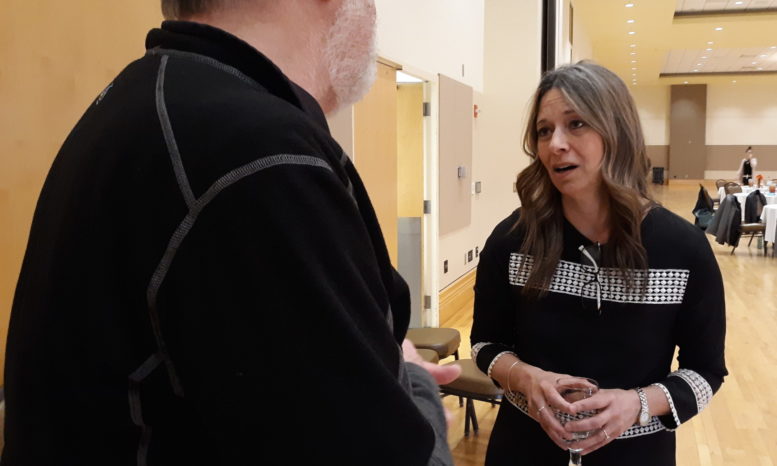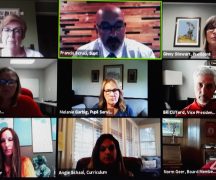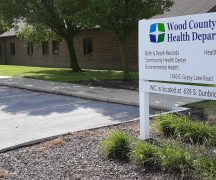By JAN LARSON McLAUGHLIN
BG Independent News
With her trademark white lab coat and straightforward talking, Dr. Amy Acton became a daily part of Ohioans’ lives when COVID first hit in early 2020.
As director of the Ohio Department of Health, Acton stood beside Gov. Mike DeWine as she spoke simply to residents about what they faced. While some scientists used complex terms to describe the pandemic, Acton talked like a trusted friend.
She spoke of the need to use the “Swiss cheese” method of prevention efforts. She compared the response to COVID as the actions taken during a stove fire.
Acton became the “Ted Lasso” of the politics surrounding the pandemic response. Even when taking the unpopular step of issuing a stay-at-home order for Ohioans, she became a “cult icon.”
By late April in 2020, Ohio’s response had resulted in fewer than 975 deaths from COVID, while Michigan suffered 3,789 in the same period.
“I’m sure you all remember her,” BGSU President Rodney Rogers said Thursday during the annual Public Health Symposium at BGSU. “She was helping us find a way forward.”
But Acton, the keynote speaker, spread out the credit Thursday with her audience of public health workers from the region.
“You will look back and know you saved each other in this state,” she said to the “heroes without capes.”
Though Acton’s daily press conferences were unscripted, the words she chose made Ohio residents feel empowered. She spoke with brutal honesty, showed her vulnerability, and expressed empathy.
“I don’t want you to be afraid,” Acton would tell Ohio citizens who tuned in to get the latest updates. “This is our one shot in this country. All of us are going to sacrifice.”
She let residents know that this was not going to have a quick fix.
“Life will be different for quite some time to come,” she said.
And she was honest about not having all the answers.
“We don’t know,” she would often say. She reassured us that vulnerability can be a strength and that she was right there with the rest of us.
“This is no small thing we are doing together,” she said, with her signature hand gestures.
As Acton looked over the crowd in the BGSU ballroom on Thursday, she marveled at the ability to gather once again.
“I’ll never take it for granted again,” she said.
She was an unlikely pick to fill the role of Ohio Department of Health director in 2019. She was not political, and was busy working on the issue of child homelessness.
“I didn’t know what I was up against,” she confessed.
During a meeting at the White House in February 2020, Acton approached the pandemic as a public health – not political – issue.
“We are at war with a common enemy,” she recalled expressing. “Everything about this virus is horrible.”
In March, when the daily press conferences began, DeWine and Acton promised to be honest with Ohioans.
“We didn’t talk political speak,” she said. “There’s one contagian worse than the virus. That’s fear. There’s so much relief in truth – even when it hurts.”
Because of a lack of federal leadership, governors had to run pandemic responses on their own. “Nobody wanted their people to die,” she said.
Nothing went smoothly. The distribution of personal protective equipment was like the “Hunger Games” with entities competing for lacking supplies. Hospitals were bidding against each other for ventilators.
The public health approach required pulling people together who don’t normally work together – hospital officials, prison wardens, school superintendents and nursing home administrators.
Within a couple months, the strong approach by DeWine and Acton had saved many lives, but was the target of much hatred. Acton recalled protesters in Guy Fawkes masks, armed with machine guns, at the statehouse.
The statehouse mailroom was filled with letters expressing anger and support.
“The hate was real,” she said. “But there was so much more love than hate.”
But the opposition to COVID efforts could be frightening for public health officials. Acton said her sons were stalked at their workplaces, and she and her husband had round the clock protection by the state patrol.
In May, protesters unhappy with Ohio’s lockdown demonstrated outside her personal residence, while multiple Republican lawmakers criticized her and attempted to curb her authority.
By mid June, 2020, Acton stepped down.
Her resignation came nearly one month after the Ohio House passed an amendment that would limit any order she issued to last just 14 days, with any extension needing to pass through a bipartisan committee of five representatives and five senators.
The amendment ultimately failed in the Ohio Senate, and DeWine said he would have vetoed it anyway. According to the author of a story in The New Yorker, Acton worried that she might be forced to sign health orders that violated her Hippocratic oath to do no harm.
Acton has since been awarded the JFK Profile in Courage Award.
The work of public health is far from over, she said on Thursday.
“What you guys have endured is almost unspeakable,” she said to the public health workers who stood strong in the face of such hatred. “You are heroes. There is collective trauma. Our task now is weaving us all back together.”
Acton is working to make sure Ohio’s response to COVID is studied, so public health can learn from it. She is also dedicated to pushing for adequate funding for public health. Too often, she said, the results from public health go unnoticed, so funding is neglected.
“It’s there, saving our lives day in and day out,” she said.
The annual public health symposium held at BGSU was started in 1999 by Ned Baker, of Bowling Green, who is a long time champion of public health.





